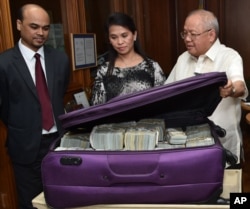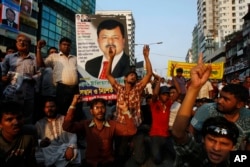Before Bangladeshi cyber security expert Tanvir Hassan Zoha was abducted by unidentified men in Dhaka last month, he had expressed fears he could be arrested for his comments to the media about an $81 million cyber heist.
Hackers had ordered the New York Fed to transfer $81 million from Bangladesh central bank funds to accounts in the Philippines. The scale of the heist created a major scandal over how the accounts had been breached.
When investigators were still piecing together what had happened, Zoha held a news conference on March 11 to raise concerns over the security standards and cybersecurity protections in place on the bank's computer servers and to fault senior bank officials.
Made claims
But Zoha also claimed that he worked for Bangladesh's department of Information and Communication Technology (ICT) and advised the government on cybersecurity issues. However, soon after Zoha’s comments were broadcast, ICT issued a statement saying that it had never had any connection with Zoha.
The authorities also shut him out of the cyber heist case where he was a key investigator.
Zoha's family claimed that his comment criticizing the bank's senior officials might have played a role behind his disappearance.
The computer expert is now back at home after a week missing, but he is not talking about who took him, or why.
Forced disappearances
That does not surprise rights activists in Bangladesh, who say such reticence is typical for victims of forced disappearances by the state.
Hong Kong-based Bangladeshi rights activist Mohammad Ashrafuzzaman said it's a routine pattern.
“In recent years, whoever returned home following such disappearances, maintained the same pattern of silence and refrained from revealing the truth in the process,” Ashrafuzzaman, who works as a liaison officer of Asian Legal Resource Center (ALRC), told VOA.
“I think Zoha, too, will not reveal the details about his disappearance, at least until Bangladesh sees a change in its regime," he said.
Soon after the Sheikh Hasina-led Awami League (AL) took to power in Bangladesh in 2009, allegations of enforced disappearances of people began surfacing in Bangladesh.
Most of those who became victims of enforced disappearances in the country were activists and leaders of the parties which are in opposition to AL.
Keeping records
According to Bangladeshi human rights group Odhikar, between January 2009 and February 2016, at least 240 persons became victims of forced disappearances in Bangladesh.
The group counted and documented only those cases where the witnesses alleged that the victims had been taken away by men who claimed or appeared to be members of the law enforcement agencies.
Among the cases documented by Odhikar, 32 were later found dead, 101 were shown arrested or freed alive, while the whereabouts of 107 people remain unknown.
Although most cases of enforced disappearances were blamed on the law enforcement agencies, only very rarely do victims or their families press for legal remedy for their detention.
No action against perpetrators
In 2013, Sajedul Islam Suman, a local leader of opposition Bangladesh Nationalist Party, was abducted along with six others by unknown men in Dhaka.
Eyewitnesses reported that men wearing black uniforms of the paramilitary force Rapid Action Battalion (RAB) forced them into a van.
“Soon after, we attempted to file suit against the security forces for the abduction. But police refused to register our complaint. They said, if in our complaint we mentioned of RAB or any security agency as being involved in the case, they would not accept the complaint,” Sanjida Islam Tulee, Sumon’s sister, told VOA.
“They said, ‘We can accept your complaint if you write only that he left home, that he has not returned and that he is missing,' " Tulee said.
Nur Khan, director of rights group Ain o Salish Kendra (ASK), noted that the fear of retribution remains strong in those who are disappeared and return home.
"They fear that if they reveal the details about their disappearances, they will have to disappear again or they will face serious threats to their lives. Basically for this reason they remain silent,” Khan told VOA.
“They believe that the people who held them in captivity were powerful and connected to high places. They also suspect, their captors enjoyed patronage by the state or could be members of the state’s security forces," Khan said.
Foreign rights groups such as Human Rights Watch and Amnesty International routinely demand Bangladesh create an independent panel to investigate forced disappearances, but there has been little progress.





